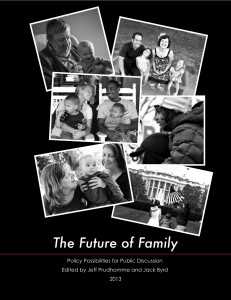Crime & Punishment: Imagining a Safer Future for All is the newest discussion guide published by the Interactivity Foundation (IF). This booklet describes five contrasting policy possibilities or frameworks for addressing concerns over the future of our criminal justice system. These concerns include both the racial inequity and the many costs of our policies of mass incarceration, the “War on Drugs”, and general get-tough-on-crime policies.
 The five policy possibilities are:
The five policy possibilities are:
- Get Smart[er] to Prevent and Better Deter More Crime
- Support Families, Strengthen Community, Reintegrate Society
- Less Prison and More and Better Treatment for Mental Illness and Substance Abuse
- Fix our Prison System
- Do the Right Thing
The Crime & Punishment discussion guide also includes introductory sections on:
- Why we should talk about crime & punishment
- “You be the judge”: a real life fact pattern to spur discussion
- “Just the facts, Ma’am”: some recent data about our criminal justice system, and
- Some Key discussion questions and considerations for evaluating all crime and punishment policies
Copies of the Crime & Punishment discussion guide for individual or small group use may be obtained, free of charge, from the Interactivity Foundation’s website by either (a) downloading a pdf (42 pages, 1.5 MB) or (b) submitting a request for printed copies (via a form also on IF’s website).
The Interactivity Foundation is a non-profit, non-partisan organization that works to enhance the process and expand the scope of our public discussions through facilitated small-group discussion of multiple and contrasting possibilities. The Foundation does not engage in political advocacy for itself, any other organization or group, or on behalf of any of the policy possibilities described in its discussion guidebooks. For more information, see the Foundation’s website at www.interactivityfoundation.org.
Resource Link: www.interactivityfoundation.org/new-discussion-guidebook-crime-punishment-now-available

 Edited by IF Fellow Jeff Prudhomme and the Interactivity Foundation’s president Jack Byrd, Jr., this guidebook asks readers to consider how public policy might respond to these concerns. It invites readers to explore and discuss what values or moral considerations shape these policies? What are the rights and responsibilities in regard to the family that public policy should take into account? How should we approach the relationship between political power and the family? What are other moral, legal, or political concerns that our family policies might need to address?
Edited by IF Fellow Jeff Prudhomme and the Interactivity Foundation’s president Jack Byrd, Jr., this guidebook asks readers to consider how public policy might respond to these concerns. It invites readers to explore and discuss what values or moral considerations shape these policies? What are the rights and responsibilities in regard to the family that public policy should take into account? How should we approach the relationship between political power and the family? What are other moral, legal, or political concerns that our family policies might need to address?


 In their book,
In their book, 